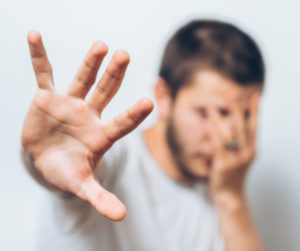Fear in the Early Stages of Recovery

This article is by Cindy Hardy and published by Addiction Center
Before Recovery, Fear May Be a Way of Life
Before recovery, people often live with a great many fears. You might be afraid of someone finding out about your substance abuse or addictive behaviors. Possibly, you might fear getting arrested or going to prison for DUI. You might be afraid of hospitalization, institutionalization, failure, crisis, relapse, or a diagnosis of a psychiatric or substance use disorder. You might also suffer from fear of loss, such as the fear of losing custody of your children, your relationships, your family connections, your job, your home, your health, or your mental capacity. Finally, as you contemplate recovery, you may fear treatment, making changes, an unknown future, punishment or retaliation from people you know, and even living life without alcohol or drugs.
Fear can become a way of life, so it is not surprising that fear will follow you as you begin recovery. The ability to look to the future with self-confidence can only be built on a track record of success. In early recovery, you will only be able to look back on the long, sad history that led you to realize you need help. As you achieve success, you will begin to lose your fears and feel confident that everything will work out well for you.
Recovery Itself Can Be Frightening
For most people, the thought of reducing alcohol and drug use and working toward sobriety can be frightening. If you live with addiction, substances have become a “trusted friend.” When you have depended on chemical crutches for a long time to “solve” your problems, endure your job, cheer yourself up, calm yourself down, alter your thinking, and help you forget what a mess life has become, it is natural to think that living life chemical-free will be painful. It is also a scary thought for people who have relied on substances to numb their fear.
Many people are afraid of joining a group or even entering a room where there are people they don’t know. Some people may mask their fear with a sneer, an attitude, anger, or humor, but you don’t need to deny your fear. It’s okay to be afraid. Any new experience can trigger a certain amount of fear for anyone. Recovery for every person is all about new experiences and challenges. You are not alone. It takes time to feel less fearful and more comfortable. To overcome fear, you must realize that fear is there. By moving in the direction of what you want, your fear will diminish and eventually go away. Fear is something to face, not something to avoid.
The Liberating Power of Sharing and Facing Fear
As the saying goes, “Sharing pain cuts it in half, sharing happiness doubles it.” There are many people who feel your same fears and it helps to express them. You will find you are among millions of individuals in recovery who are making this same journey. By sharing your feelings, you take the power away from fear, make it manageable, and unite yourself with others. You gain strength, courage, and confidence with each new experience when you really stop and look fear in the face. You are able to say, “I lived through this. I can take the next thing that comes along.” You must do what you think you cannot do, despite fear.
Most fears come from living a fearful past and projecting fear into the future. Most people will agree they can handle this day…today! The choice is up to each person. By living in the present, all you must overcome is today’s fear. With this victory comes serenity and the peace of living in the moment. In recovery, yesterday is history, tomorrow is a mystery, and today is a gift. That’s why they call it the present!
With fear in charge, you can never fully relax, let your guard down, and be your true self. You can’t open up because you’re afraid of how people will respond if they meet your real self. With fear in charge, you simply cannot take that chance. Fear does not allow honesty, fear despises spontaneity, and fear does not let you believe in yourself. Your goal should be to live a life that is not ruled by fear.